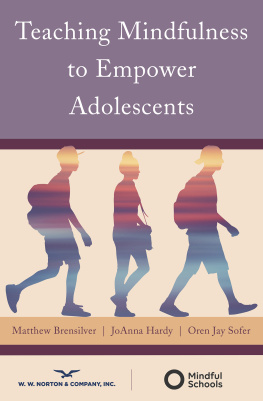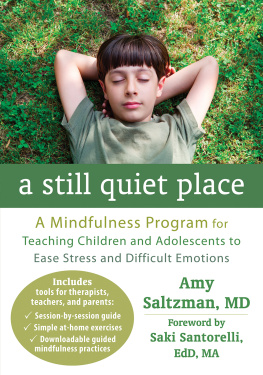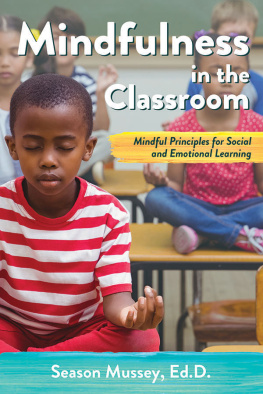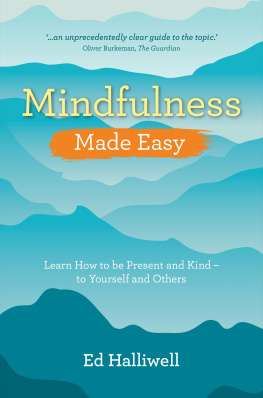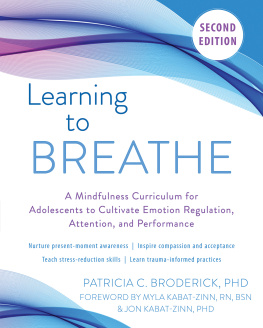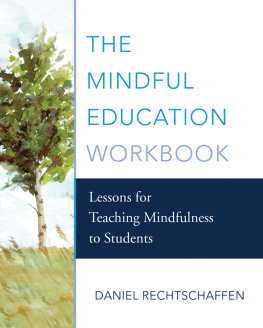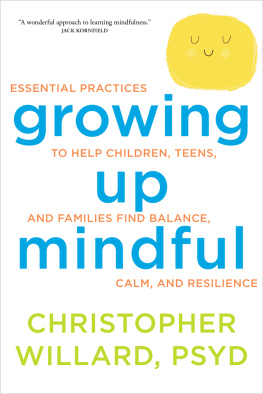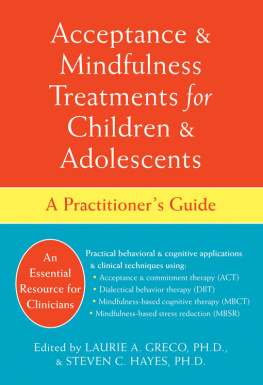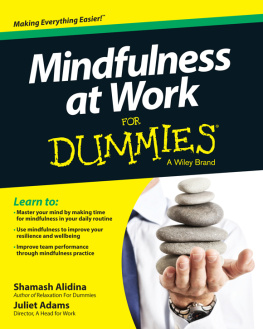
Teaching Mindfulness
to Empower
Adolescents
Teaching Mindfulness
to Empower
Adolescents
Matthew Brensilver | JoAnna Hardy | Oren Jay Sofer

W.W. NORTON & COMPANY
Independent Publishers Since 1923
NORTON BOOKS IN EDUCATION
Note to Readers: Models and/or techniques described in this volume are illustrative or are included for general informational purposes only; neither the authors nor the publisher can guarantee the efficacy or appropriateness of any particular recommendation in every circumstance. Names and potentially identifying characteristics of individual students and educators have been changed or are used with permission. The authors and the publisher are not responsible for, and should not be deemed to endorse or recommend, any website other than their or its own or any third-party content available on the internet (including without limitation at any website, blog page, information page).
To Jeff, Joanne, and Greg, for weathering my adolescence.
Matthew
To all of the young people who trusted my guidance and shared their beautiful hearts and minds with me over the past twenty years. And to CJ, Harris, and Andre for your unwavering love, laughter, kindness, and support.
JoAnna
For the young adults and adolescents who are struggling to find their way in a world on fire. And for the parents, teachers, and educators who are working to support young people. May we find the humility, love, and wisdom to learn from each other.
Oren
This book owes a great debt to the contributions of two people in the wider field of mindfulness in education: Megan Cowan and Chris McKenna. Megan cofounded Mindful Schools, developing the first version of its mindfulness curriculum and piloting the program in the schools of Oakland, California. She was later joined at Mindful Schools by Program Director Chris McKenna, who brought his expertise in curriculum development, organizational management, and trauma-informed mindfulness practice. Together, Megan and Chris inspired thousands of educators around the world to learn, practice, and share mindfulness in schools. For years, we have worked closely with Megan and Chris and two other beloved colleagues, Pam Dunn and Vinny Ferraro. Though their names appear infrequently in the text, the imprint of their ideas is intimately woven throughout these pages.
We also wish to express our deep gratitude to the educators, counselors, and facilitators sharing mindfulness with youth every day in schools, agencies, and programs. In particular, we would like to thank the following individuals for their generosity in offering their expertise and stories through interviews that we conducted for this book: Khalila Gillett Archer, Enrique Collazo, Morris Ervin, Forest Fein, Jozen Tamori Gibson, Jessica Morey, Charisse Minerva, Dave Smith, Jaylin Speight, Bart van Melik, and Doug Worthen.
We would like to thank our own meditation teachers and mentors. Without their transmission and guidance, we would lack the practice and understanding that allow us to teach young people and write from our own experience: Ajahn Sucitto, Diana Winston, Gil Fronsdal, Godwin Samararatne, Jack Kornfield, Joseph Goldstein, Kittisaro, Marvin Belzer, Michele McDonald, Shinzen Young, Shri Natha Devi, and Thanissara.
Finally, this book would not be possible without the young people each of us has had the privilege of knowing. As we share in these pages, we learn as much from them as they learn from us. Our hope is that this book benefits their learning, growth and future.
Think back to your adolescence. What did you want most from the adults around you? How did you want to be treated? What conversations did you long to be having, but could not? We view mindfulness less as a technique and more as a deeply honest conversation with ourselves and with each other. It is a conversation that includes all of the joy and sorrow, love and loss that constitutes a human life.
As adults, we can facilitate this radical honesty within and among adolescents. When we sit together in a room with young people, we silently express our abiding wish that they might be happy. As we look around at their faces, the power and potential of their lives is palpable. Its a privilege to spend time with young people and see the light inside go on when they discover the landscape of their minds and sense the freedom that comes from self-understanding.
We sit with them, aware of our shared goodness and our shared imperfection. We hope to help them grow and are willing to be changed by them. In this willingness, they can sense our care.
How can we as educators, as parents, and as caring adults support adolescents to understand themselves and transform the world they are inheriting? How can we uncover their innate gifts and passions in a society that is often dismissive of their voices? Harnessing the potentials of adolescence requires that we reexamine this stage of human life and provide more support for empowering their voices.
Although adolescence is often caricatured as a phase of self-absorption, it is also a time when altruistic concerns become urgent and sensitivity to fairness is heightened (Bryan et al., 2016).
Its not surprising that adolescents, unburdened by the dogmas of a previous generation, agitate for social change and influence the evolution of societal norms. Young people push the boundaries of the status quo and challenge adults to grow, learn, and adapt. Whether its the swell of youth support for the Black Lives Matter movement, students who have been targets of school violence organizing for gun control, teens challenging traditional gender roles, or Greta Thunberg addressing members the UN Climate Change Conference and being catapulted into a role of world leadership, adolescents are demanding a voice in the conversation about the direction of our society.
Our society is often structured to meet the needs of adults, forcing children to conform to an adult world, rather than working to discover what children need to learn, grow, and contribute in meaningful ways. One can see this on a daily basis in the simplest of interactions: young children are routinely discouraged from crying or expressing emotion, and this is to meet adults needs for ease or efficiency. Witness the immediate stress and embarrassment of a parent in a public place when their child begins crying or misbehavingacting like a child instead of a miniature adult. In many schools, children are required to study the same subjects in the same ways regardless of differences in learning styles and interest. Even the modern phenomenon of so-called helicopter parenting, in which parents become overly obsessed with a childs needs, can be understood as a response to our cultures emphasis on material success, which places extraordinary pressure and unrealistic expectations on parents to maximize their childrens achievement. This is evidenced in the recent scandal about parents who are accused of paying hundreds of thousands of dollars in bribes to get their children admitted to prestigious universities.
We believe that education is about more than transmitting information and that mindfulness can play a key role in the healthy maturation of teens and young adults. Mindfulness is a valuable life skill and a key developmental ingredient. Perhaps even more, self-awareness is a right. As Socrates once said over 2000 years ago (while on trial in part for corrupting youth with his ideas), The unexamined life is not worth living. Introspection is a gateway to self-discovery, understanding, and fulfillment.
Next page
